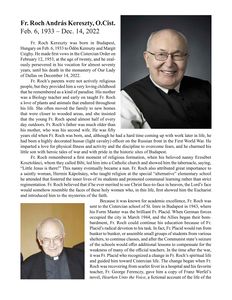Kereszty, Rochus Andras (1933-2022)
Auszüge aus der klösterlichen Todesanzeige
After many trials, Fr. Roch made his solemn vows (for Zirc) at the Abbey of Lilienfeld on September 18, 1960, and was ordained a priest on October 2 in the private chapel of the episcopal palace in Sankt Pölten. He returned to Rome for a few more years of happy life studying St. Bernard and writing about Wisdom in his theology, time during which he, along with other students, could witness the opening of the Second Vatican Council.
In 1963 Fr. Roch began his lifelong work of teaching theology, first at the University of Dallas, where he was also briefly chaplain, and from 1967 onward also at the Cistercian Preparatory School. He taught full-time at UD until 1970, when he took over as Form Master at Cistercian, but he continued teaching one course each semester at UD until his retirement in 2019.
He was devoted to a renewal of theology through a proper return to the sources, to Scripture, Tradition, and the Liturgy, in a way that responds to the actual existential questions of people today. Throughout his career, Fr. Roch produced a series of textbooks to fill whatever gaps he perceived. With important works on Christology, on the Eucharist, on spiritual life, on the nature of the Church, on the priestly life, on Christianity’s understanding of itself in light of other religions, and with other writings and efforts, he established himself as one of the preeminent Catholic theologians of his time. Inspired by his model, St. Bernard of Clairvaux, Fr. Roch aimed to speak of theology in a stalwartly orthodox but also spiritually open way, in which the mysteries of the Christian faith were not abstract ideals but true experiences and encounters with the Person of Jesus Christ calling the soul to life.
Artikel auf Wikipedia
Hier.
